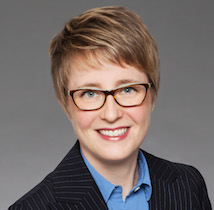Why do people who are overqualified for their job experience more rudeness at work? That’s the important question Dana Kabat-Farr, an Assistant Professor from Dal’s Faculty of Management, is hoping to answer in an innovative new study.
 Dr. Kabat-Farr’s research, which will be supported by a , will focus on the incivility experiences of overqualified employees.
Dr. Kabat-Farr’s research, which will be supported by a , will focus on the incivility experiences of overqualified employees.
Established in 2011, SSHRC’s Insight Development Grants enable the exploration of new research questions, as well as experimentation with new methods, theoretical approaches and ideas.
“A grant like this is incredibly important to our research, because it allows us to financially compensate participants for completing various parts of the survey, and hire graduate students to help in the lab,” says Dr. Kabat-Farr.
Understanding incivility in the workplace
Canadians are increasingly working in jobs where they have surplus skills or surplus education and qualifications.
According to Dr. Kabat-Farr, a lot of this might be the result of a more highly educated workforce (multiple post-secondary degrees are very common), and the economic downturn in 2008, which not only caused a number of layoffs, but also a need to have multiple jobs. Â
These overqualified workers can face incivility on a regular basis, and it can take a number of forms that are not always overt. They may be interrupted, not acknowledged in a meeting or not told about opportunities when they exist.
Dr. Kabat-Farr’s research will take roughly two years to complete, and will involve student samples participating in a laboratory study. The research team, comprised of Dr. Camilla Holmvall of Saint Mary’s University, Dr. Francis McKee-Ryan of the University of Nevada, Reno, and Dr. Benjamin Walsh of University of Illinois at Springfield, will look at how the study participants interact with their overqualified peers. Â
“This study will look at how interpersonal interactions may be qualitatively different for people who are overqualified, such that they might experience more rudeness at work, or more incivility at work,” says Dr. Kabat-Farr. “We think this may stem from people feeling envious of someone’s competence or worry that an overqualified person might be tapped for a leadership role even though they are new to the organization.”
In addition, Dr. Kabat-Farr and her team will be looking at overqualified women, and if they might be at an increased risk of this incivility.
“We know that many people have traditional gender beliefs about women’s roles and life and work more generally,” says Dr. Kabat-Farr. “So, we’re looking at that as a potential moderating factor that might exacerbate the risk of incivility for women who are overqualified, in particular.
When complete, the results of Dr. Kabat-Farr’s study will be published in a peer-reviewed manuscript.
Enabling the exploration of new research questions
In addition to Dr. Kabat-Farr, a number of other researchers from HÂţ» also received Insight Development grants. They include:
- Niki Kiepek (Faculty of Health), with co-applicant Brenda Beagan (Faculty of Health) and collaborator Jonathan Harris (Faculty of Health)
Project title: Substance use and professional socialization - Steven Kivinen (Faculty of Science), with co-applicant Norov Tumennasan (Faculty of Science)
Project title: Consensus and Disagreement in Social Networks - Heather Neyedli (Faculty of Health), with co-applicant Lori Dithurbide (Faculty of Health)
Project title: Trust in Human and Automated Teammates - Bart Vautour (Faculty of Arts and Social Sciences)
Project title: Embassy Cultures: Building the Libraries and Cultural Life of Canada’s Foreign Missions - Jeffrey Wilson (Faculty of Management), with co-applicant Hayden Anders (Faculty of Arts and Social Sciences)
Project title: Beyond GDP, understanding the impacts of alternative indicators in practice: Motivations, policy changes, and building a new economic narrative
More information about the recipients can be found on the .

